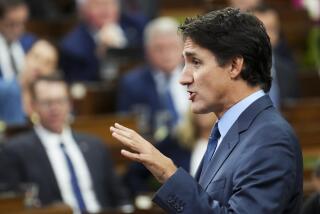1990 Confrontation Haunts Debate Over Quebec
MONTREAL â More than four years after it happened, a lethal confrontation between militant Mohawk Indians and Canadian authorities near the suburb of Oka continues to poison relations between whites and native people in Quebec.
And it serves as a reminder of the potential for violence as native people and the Quebec government debate the emotional issue of Quebec independence.
The 1990 crisis began with an attempt by the white-governed town of Oka to extend a golf course onto an Indian burial ground. Mohawks blocked the road in protest, and when Quebec provincial police mounted a raid on demonstrators, gunfire erupted. One officer was killed.
The Canadian army was called in and took up the siege. After three months, the standoff ended without any more fatalities. But the anger lingers.
Montreal lawyer Bernard Roy, who negotiated with the Mohawks while an official in the government of then-Prime Minister Brian Mulroney, said the breakdown in relations between white and native Quebeckers has replaced the divide between English and French speakers as the chief source of tension in the province.
The Oka incident also demolished much of the white sympathy for redressing injustices toward native people that exists elsewhere in Canada, he said.
Michael Mitchell, who was chief in the Akwesasne Mohawk Reserve on the Quebec-Ontario-New York border for 10 years, said the debate over Quebecâs future brings the animosity back to the surface. âThe hatred runs deep on both sides and the denial runs deep,â he said. âBut the Mohawks are not afraid of Quebec. We have the backbone. They know we can stand up.â
Mary Ellen Turpel, an associate professor of law at the University of Toronto and legal adviser to the Assembly of First Nations, worries about the potential for violence.
She said she fears that a unilateral declaration of independence by Quebec would be seen by some Indians as a âdeclaration of warâ and that high unemployment rates in Indian communities provide a ready pool of combatants.
âIf you really wanted to mobilize people, you could, because there are a lot of people with nothing to do,â said Turpel, who describes herself as a âcommitted pacifist.â
âYou can never predict what will happen,â she said. âJust because Canada is a peaceful country doesnât mean you canât have a civil war. If you can have an armed conflict over a small burial ground, then what can you have if youâre talking about an entire territory?â
More to Read
Sign up for Essential California
The most important California stories and recommendations in your inbox every morning.
You may occasionally receive promotional content from the Los Angeles Times.










